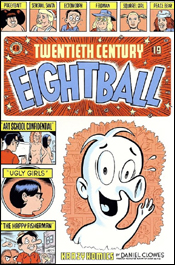 20th Century Eightball
20th Century Eightball
Writer: Daniel Clowes
Artist: Daniel Clowes
By Paul De Angelis
It isn't news that we get aggravated by other people. But it's surprising how often and how easily we do, especially when it's over things that in no way affect us. I'm not referring to complaints about creationists or teens, or any other group that can be shown to be detrimental to society. I'm talking about getting aggravated at homosexuals, gamers, yuppies, Trekkies, or anybody whose taste in clothes or music we dislike. We spend far too much time getting turned off by the lifestyles or hobbies of others.
A collection of comics originally published between 1988 and 1996, 20th Century Eightball is full of people who aggravate writer/illustrator Daniel Clowes: urban attention-seekers, idealists, fanatics, military types, new agers, musclemen, humorless cartoonists, state-of-the-art technological bores, amateur psychiatrists, etc. You can nod in agreement and laugh along with his choices, but these are childishly intolerant concerns. It also gets to be tiresome; at least in the original issues of Eightball, these stories were broken up by continuing series like Ghost World and Like a Velvet Glove Cast in Iron.
Along with Clowes's excessive bitterness, there are a few other problems with this collection:
01. Although quite capable of using the medium effectively, Clowes sometimes writes stories that don't take advantage of the graphic nature of comics. "Give it Up" and "Chicago", for example, are nothing more than extended monologues.
02. Clowes sometimes conducts pre-emptive strikes. By revealing an abrupt ending as the result of poor planning, he heads off any criticism of lazy writing. It may be amusingly self-deprecating when he admits it, but that doesn't make the ending any less disappointing. Also, his self-consciousness sometimes feels more like self-absorption than creative introspection.
03. This collection contains clever and funny ideas. And while punch lines or big payoffs aren't necessary, far too often a good plotline falls apart in the last panel or two. Clowes simply doesn't give enough attention to his endings, allowing them to fizzle out. "Feldman" is a man who phones a coffee shop to get the "question of the day" so he can look up the answer on his computer and win a free coffee. The final panel has Feldman saying to the reader, "Yes, as a matter of fact I do rule the universe". It's a pointless remark for an entertainingly offbeat idea for which Clowes apparently had no conclusion.
Despite these flaws, Clowes' work still comes highly recommended:
01. He's a unique talent with a distinctive style. Being different in itself isn't enough, but his stories are original and unpredictable without it feeling like he's being weird just for the sake of being weird. For example, even when he's complaining about all the groups that aggravate him, he still manages to throw in some unexpected ones: "people who don't capitalize their names"; art school students who cultivate a "grim, sullen demeanor" and whose work is always "a Frazetta-style painting of [a] barbarian"; and "wealthy children who attempt to buy in to the inherent 'hipness' of the economic underclass".
02. Clowes sometimes includes nudity or obscenities, but he never draws attention to it. There's no attempt to make a clear demarcation between general material and stories meant only for mature audiences, nothing feels like it's forcibly adult. He drops the more risqué material in wherever it's needed. In a way, Clowes's work is akin to European films in their nonchalance, as opposed to American films that are far too self-conscious about sex, taboo subjects, and questionable material.
03. But the most important thing about Clowes is that he has that one quality that makes ignoring the negative aspects of his work so easy. As he demonstrates in stories like "Little Enid" (written specially for this collection), and "Playful Obsession" (a strange variation on Richie Rich and Casper), Clowes is a damn funny guy.

